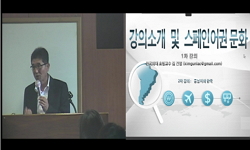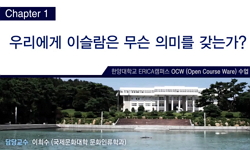Spain, which was the frontier of the world, appears in world history through Mediterranean civilization. The Mediterranean Sea is the sea of openness that opened the doors of Spain and the sea of meeting with others. Spain, which has been incorporated...
http://chineseinput.net/에서 pinyin(병음)방식으로 중국어를 변환할 수 있습니다.
변환된 중국어를 복사하여 사용하시면 됩니다.
- 中文 을 입력하시려면 zhongwen을 입력하시고 space를누르시면됩니다.
- 北京 을 입력하시려면 beijing을 입력하시고 space를 누르시면 됩니다.

`두 개의 스페인`에 나타난 지중해 정신 연구-니코스 카잔차키스의 『스페인 기행』을 중심으로- = A Study on the Mediterranean Spirit in `Two Spains`-Focusing on Spain of Nikos Kazantzakis-
한글로보기https://www.riss.kr/link?id=A102957171
- 저자
- 발행기관
- 학술지명
- 권호사항
-
발행연도
2017
-
작성언어
Korean
-
주제어
카잔차키스 ; 지중해 ; 스페인 ; 그리스 ; 이슬람 ; 바로크 ; 기행문학 ; Kazantzakis ; The Mediterranean ; Spain ; Greece ; Islam ; Baroque ; Travel literature
-
KDC
988.605
-
등재정보
KCI등재
-
자료형태
학술저널
-
수록면
81-101(21쪽)
-
KCI 피인용횟수
0
- DOI식별코드
- 제공처
- 소장기관
-
0
상세조회 -
0
다운로드
부가정보
다국어 초록 (Multilingual Abstract)
Spain, which was the frontier of the world, appears in world history through Mediterranean civilization. The Mediterranean Sea is the sea of openness that opened the doors of Spain and the sea of meeting with others. Spain, which has been incorporated into the Mediterranean civilization, has had a tradition of coexistence of contradictory elements. Two of the many Greeks who had stepped on the Spanish soil after Hercules were El Greco and Kazantzakis. Like El Greco, Cretan born Kazankzakis sought liberty and craved salvation as a typical Mediterranean writer. He traveled to Spain four times in the early 20th century and left a travel writing. The purpose of this article is to explore what Spain is and how it relates to the universal Mediterranean and, moreover, to the writer`s own identity. Kazantzakis says Spain has two faces. However, the history of Spain has shown the coexistence of two opposing elements, like the relationship between Don Quixote and Sancho Panza. It was influenced by Mediterranean culture, a sea of openness and communication. With the beginning of the Atlantic era, Spain built an empire in which the sun never set and culturally a Golden Age began with brilliant art and literature. But the collapse of Spain was foreseen. This is because Spain has lost the Mediterranean spirit of coexistence and harmony and is on the road of isolation. In the Mediterranean civilization, Christians and Muslims have coexisted in repeated conflicts and reconciliations. But Spain denies the roots of the Arabs that are imprinted on them. What Kazantzakis witnessed through his travels to Spain is a dark figure that denies the Other. The vitality of the cultural renaissance in the early 20th century is about to disappear. Here, Kazantzakis confirms a deep spiritual bond with El Greco. Like El Greco, who captures the essence behind the phenomenon, Kazantzakis also sees the essence of Spain, where two elements are at odds with each other. But his journey is also a reflection of his life seeking freedom and salvation. Through his travels to Spain, he finds himself and his homeland. Finally, he returns to himself like Odysseus who returns to Ithaca through the Mediterranean sea.
참고문헌 (Reference)
1 윤정임, "키뮈-사르트르 논쟁사" 인문학연구원 1 : 5-28, 2011
2 신옥희, "초인과 조르바: 니이체의 철학사상과 니코스 카잔차키스의 문학세계" (72) : 124-146, 2007
3 이기언, "지중해, 문명의 바다를 가다" 한길사 2005
4 김정하, "지중해, 다문화 문명의 바다" 국제지역문화원 5 (5): 25-52, 2014
5 정수일, "지중해 문명과 지중해학" 지중해지역원 5 (5): 1-23, 2003
6 Kazantzakis, Nikos, "지중해 기행" 열린책들 2008
7 Kazantzakis, Nikos, "오디세이아 1, 2, 3" 열린책들 2008
8 Kazantzakis, Nikos, "영혼의 자서전 1, 2" 열린책들 2008
9 김상근, "엘 그레꼬: 지중해의 영혼을 그린 화가" 연세대학교 출판부 2009
10 Elliott, John H, "스페인 제국사 1469-1716" 까치글방 1963
1 윤정임, "키뮈-사르트르 논쟁사" 인문학연구원 1 : 5-28, 2011
2 신옥희, "초인과 조르바: 니이체의 철학사상과 니코스 카잔차키스의 문학세계" (72) : 124-146, 2007
3 이기언, "지중해, 문명의 바다를 가다" 한길사 2005
4 김정하, "지중해, 다문화 문명의 바다" 국제지역문화원 5 (5): 25-52, 2014
5 정수일, "지중해 문명과 지중해학" 지중해지역원 5 (5): 1-23, 2003
6 Kazantzakis, Nikos, "지중해 기행" 열린책들 2008
7 Kazantzakis, Nikos, "오디세이아 1, 2, 3" 열린책들 2008
8 Kazantzakis, Nikos, "영혼의 자서전 1, 2" 열린책들 2008
9 김상근, "엘 그레꼬: 지중해의 영혼을 그린 화가" 연세대학교 출판부 2009
10 Elliott, John H, "스페인 제국사 1469-1716" 까치글방 1963
11 Kazantzakis, Nikos, "스페인 기행" 열린책들 2008
12 Nietzsche, Friedrich, "선악의 저편⋅도덕의 계보" 책세상 2002
13 Fuentes, Carlos, "라틴아메리카의 역사" 까치글방 1997
14 신정환, "두개의 스페인: 알타미라에서 펠리뻬 6세까지" 한국외대 지식출판원 2016
15 안남연, "그리스인 조르바에 나타난 인간의 자유와 삶의 의미" (7) : 167-187, 2014
16 Kazantzakis, Nikos, "그리스 인 조르바" 열린책들 2000
17 윤용수, "고대 지중해 문명 교류의 거대사적 해석" 지중해지역원 18 (18): 99-129, 2016
18 Johnson, Carroll B, "The Quest of Modern Fiction" Twayne Publishers 1990
19 Braudel, Fernand, "The Mediterranean and the Mediterranean World in the Age of Philip II, Vol. II" Harper & Row 1976
20 Fraser, Benjamin, "Nikos Kazantzakis’s Bergsonian Spain: Connecting Philosophy, Spanish Literature and Cultural Landscapes" 168 : 37-54, 2013
21 Arampatzidou, Lena, "Nikos Kazantzakis and Travel Writing: Innovating in Poetics and Politics" VIII : 179-208, 2011
22 Castro, Americo, "Mediterranean Passages: Reading from Dido to Derrida" University of North Carolina Press 2008
23 Cassano, Franco, "Mediterranean Passages: Reading from Dido to Derrida" University of North Carolina Press 2008
24 Hegel, Georg Wilhelm Friedrich, "Lectures on the Philosophy of World History" Cambridge University Press 1984
25 Hatzantonis, Emmanuel, "Kazantzakis’ Spiritual Itinerary through Spain" 49 (49): 787-792, 1966
26 Fogu, Claudio, "Italy in the Mediterranean Today: A New Critical Topography" California Italian Studies 1 (1): 1-9, 2010
27 Hatzfeld, Helmut, "Estudios sobre el barroco" Gredos 1966
28 Paleologos, Konstantinos, "El traductor Nikos Kazantzakis y la poesía española de la Edad de Plata" 13 : 154-159, 2007
29 Caparrós, Martín, "El interior" Malpaso 2014
30 Bassegoda, Juan, "El gran Gaudí" Sabadell 1989
31 Stavrou, Niki P, "A Glance upon his Life"
32 Albérès, René M, "20世紀의 知的 冒險" 을유문화사 1981
33 Dussel, Enrique Domingo, "1492년 타자의 은폐. ‘근대성 신화’의 기원을 찾아서" 그린비 2011
동일학술지(권/호) 다른 논문
-
척도 함의를 갖는 양화구 menos de n의 도출적 구조
- 부산외국어대학교 지중해연구소
- 곽재용 ( Kwak Jaeyong )
- 2017
- KCI등재
-
- 부산외국어대학교 지중해연구소
- 김헌 ( Kim Heon )
- 2017
- KCI등재
-
현대그리스어 학습을 위한 그리스어의 과거시제와 상(aspect)체계
- 부산외국어대학교 지중해연구소
- 김혜진 ( Hyejin Kim )
- 2017
- KCI등재
-
- 부산외국어대학교 지중해연구소
- 이만희 ( Lee Man-hee )
- 2017
- KCI등재
분석정보
인용정보 인용지수 설명보기
학술지 이력
| 연월일 | 이력구분 | 이력상세 | 등재구분 |
|---|---|---|---|
| 2027 | 평가예정 | 재인증평가 신청대상 (재인증) | |
| 2021-01-01 | 평가 | 등재학술지 유지 (재인증) |  |
| 2018-01-01 | 평가 | 등재학술지 유지 (등재유지) |  |
| 2016-02-12 | 학술지명변경 | 외국어명 : 미등록 -> Journal of Mediterranean Area Studies |  |
| 2015-01-01 | 평가 | 등재학술지 유지 (등재유지) |  |
| 2011-01-01 | 평가 | 등재학술지 유지 (등재유지) |  |
| 2009-01-01 | 평가 | 등재학술지 유지 (등재유지) |  |
| 2008-04-17 | 학회명변경 | 한글명 : 지중해연구소 -> 지중해지역원영문명 : Institute for Mediterranean Studies -> 상동 |  |
| 2006-01-01 | 평가 | 등재학술지 선정 (등재후보2차) |  |
| 2005-01-01 | 평가 | 등재후보 1차 PASS (등재후보1차) |  |
| 2003-01-01 | 평가 | 등재후보학술지 선정 (신규평가) |  |
학술지 인용정보
| 기준연도 | WOS-KCI 통합IF(2년) | KCIF(2년) | KCIF(3년) |
|---|---|---|---|
| 2016 | 0.47 | 0.47 | 0.48 |
| KCIF(4년) | KCIF(5년) | 중심성지수(3년) | 즉시성지수 |
| 0.39 | 0.37 | 0.935 | 0.16 |





 RISS
RISS KISS
KISS







